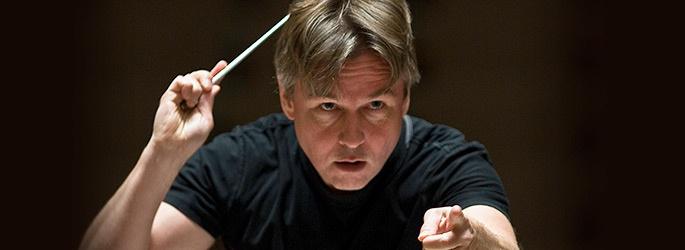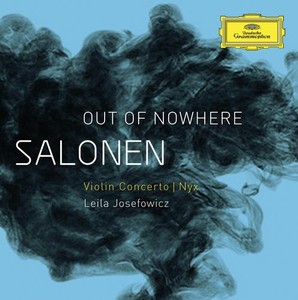Fuse Classical CD Review: “Out of Nowhere” (Leila Josefowicz/Finnish Radio Symphony Orchestra/Esa-Pekka Salonen)
Now in his mid-50s, Esa-Pekka Salonen is one of the most interesting and important composers of his generation, and the recent attention his music is receiving is well deserved.
Out of Nowhere, Violin Concerto, Nyx by Esa-Pekka Salonen. Performed by Leila Josefowicz and the Finnish Radio Symphony Orchestra. Deutsche Grammophon.
By Jonathan Blumhofer.
When he stepped down as music director of the Los Angeles Philharmonic in 2009, Esa-Pekka Salonen said he hoped his future life would allow him to strike a balance between composing and conducting. Assuming the directorship of the Philharmonia Orchestra in London has since kept him from the former task more often than not, but the two major scores he has written in the last nearly four years are compelling. Both works are showcased on his new Deutsche Grammophon recording, Out of Nowhere, an album featuring violinist Leila Josefowicz performing his Violin Concerto and the Finnish Radio Symphony Orchestra (RSO) playing the orchestral piece, Nyx (all conducted by the composer).
Not surprisingly, the California-cool Violin Concerto, which won the 2012 Grawemeyer Award, receives a blistering reading from Josefowicz (its dedicatee) and the Finnish RSO, which accompanies with a blend of musical sensitivity and technical command that’s breathtaking. For those who heard Josefowicz’s performance of this piece at Symphony Hall in April, not much is different here: balances are unsurprisingly better on disc (the percussion doesn’t cover up the soloist at the end of the third movement, for instance), though her interpretation remains largely the same.
As a composer, Salonen is carving out a distinctive space for his music to inhabit. There remain echoes of the European modernism in which he was raised, but these tendencies are regularly tempered by a sense of freedom and spontaneity that gives the Concerto, especially, a decidedly accessible sheen.
And the piece has a lot going for it. There are extended moments (including much of the first two movements) in which Salonen seems to be simply reveling in new sonic combinations and textures. The urban jungle of the third movement, with its drum kit/solo violin duet (replete with wild glissandi) is possibly the most raucous moment in three century’s worth of violin concerto repertoire, while the finale (titled Adieu) features some of the most openly heartfelt writing in contemporary music of the last 15 years. Josefowicz and the Finnish RSO capture all the music’s exuberance, melancholy, wistfulness, and, ultimately, ambiguity with haunting clarity and focus: this is a great piece, beautifully realized.
Nyx, Salonen’s 2010 effort to evoke the shadowy characteristics of the Greek goddess of night, comes off less successfully than does the Concerto. This has nothing to do with the playing of the Finnish RSO, which is top-notch throughout; rather, Salonen’s music, generally, is occasionally plagued with the problem of attempting to make too much out of too little, and so it is here.
Certainly he’s not the first composer to suffer from the disease—Richard Strauss and Shostakovich (among many other composers) exhibit similar symptoms—and, like Strauss, Salonen often manages to keep the action and tension moving through stretches of sheer orchestrational brilliance. But, as in earlier pieces (Insomnia, Wing on Wing, the Piano Concerto come to mind), the thinness of some of Salonen’s material shows on repeated listening. The shifting, bustling textures and winding melodic lines are ear catching, to be sure, but what expressive ends do they serve? In Ives, Lutoslawski, and Mahler such purposes are clear, but in Nyx there’s a sense that all this activity, full of sound and fury, signifies not so much.

Composer/conductor Esa-Pekka Salonen: his composition NYX is ear-catching but what expressive ends does it serve?
Still, Nyx has many beautiful individual moments, and this performance is about as good as one might expect to hear. Despite its shortcomings, it’s a piece that demonstrates the remarkable trajectory Salonen’s compositional career has taken over the last 30 years and leaves an open question as to what will come next.
I, for one, am looking forward to whatever that “next” will be: now in his mid-50s, Salonen is one of the most interesting and important composers of his generation, and the recent attention his music is receiving is well deserved. Where his music will end up in the pantheon of great composers is anyone’s guess, but, with the Violin Concerto, Salonen has created perhaps the first masterpiece in the genre for the new century and a welcome addition to the canon—and, now, his discography—it is.
Tagged: Deutsche Grammophon, Esa-Pekka Salonen, Leila Josefowicz

